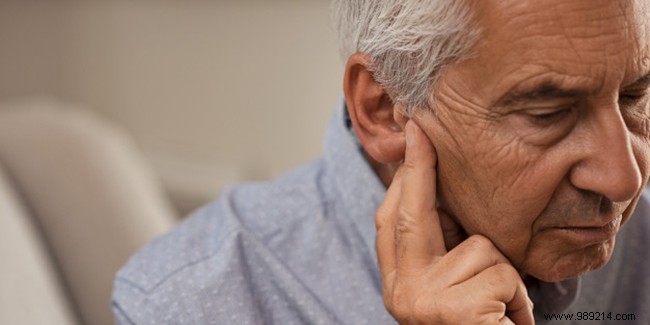
Caused by trauma or aging of the auditory system, tinnitus is noise you hear in one ear (or both) or inside your head when no outside source is producing it. 8 million French people suffer from tinnitus according to Health Insurance. In particular, they can cause insomnia, anxiety and even depression. Depending on its origin, which may be the normal aging of the ear, tinnitus can be cured or limited by adopting specific measures.
Tinnitus is noise heard by a person that is not caused by outside noise. Depending on the person, the sensation felt resembles either a buzzing, a hissing, a squealing, a ringing, a whirring, a chirping, or a rattling.
Tinnitus can appear suddenly in a specific environment such as during a noisy concert, fatigue, stress, change of position of the head or, on the contrary, occur gradually. These noises heard at the level of the ears (one or both) or in the skull (mostly felt at the level of its top) are either constant or intermittent.
Tinnitus is of two kinds. The rarest are called "objective" tinnitus. They are due to the sound of an organ such as the sound of blood circulating in the vessels of the head. They have the particularity of being able to be heard by an outside person. This tinnitus can most often be cured thanks to treatments adapted to their cause (cardiovascular disease, arterial hypertension, etc.).
Another type of tinnitus, called "subjective", is caused by an ear disease and results in ringing or ringing in the ears that an outside person cannot hear. They represent most cases of tinnitus in people who suffer from it and are generally associated with hearing problems. Their cause is generally prolonged exposure to intense and repeated noises or diseases of the hearing system (otitis, degeneration of the ossicles of the ear, Ménière's disease which causes chronic vertigo, damage to the auditory nerve, etc. ).
“Subjective” tinnitus also occurs in people over 50 due to a loss of hearing due to normal aging of the ear, called presbycusis.
To be able to treat tinnitus, it is first necessary to find the cause. An examination by an ear, nose and throat doctor (ENT) should be performed. Using investigations of the ears, nose and throat, this professional also checks the patient for symptoms that may be associated with tinnitus such as dizziness, nausea, vomiting, disturbances in balance, decreased hearing, ear pain, or fever and chills. ENT also assesses the consequences of tinnitus on the patient's daily life.
In the event that a cause for the occurrence of tinnitus is identified, it is possible to treat it to cure it or reduce it by treating this cause such as, for example, an otitis, a plug of earwax, an anomaly of an artery, etc.
People who suffer from a loss of hearing in parallel with tinnitus will see an improvement in their condition by the installation of a hearing aid which often attenuates these unwanted noises in the ear.
In most cases, there is no cause that explains the occurrence of tinnitus. It is therefore not possible to treat them. Nevertheless, there are solutions to mitigate them and less feel their effects on health and everyday life.
People who suffer from stress or anxiety because of tinnitus may be referred by their doctor to behavioral and cognitive therapies that aim to help the patient live better with their tinnitus, or they will be advised to undergo treatment with tinnitus. 'anxiolytics or antidepressants.
Finally, some doctors suggest that their patient wear a small prosthesis called a "noise generator" at ear level, several hours a day and for about 18 months, which produces a slight background noise intended to mask the tinnitus. and get used to living with it.
Prevention is also very important when it comes to tinnitus. First, it is important to protect your ears from loud and prolonged noises. Then, it is necessary to take good care of your ears, in particular by avoiding the use of cotton swabs which promote the appearance of earwax plugs causing tinnitus, to treat ear infections properly, but also to avoid taking aspirin and anti-inflammatories which, in high doses, can damage the ears and also cause tinnitus.